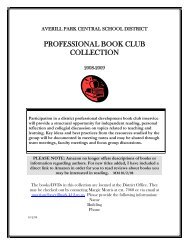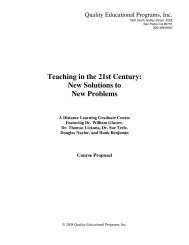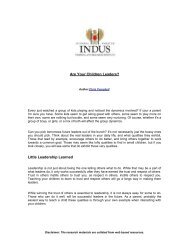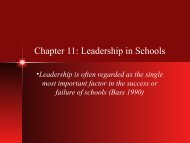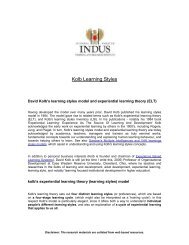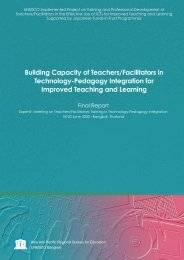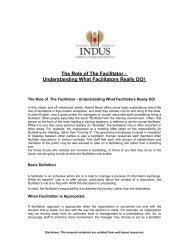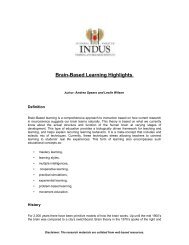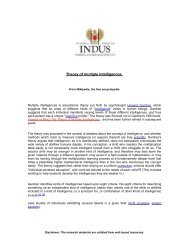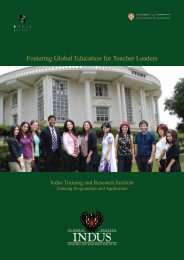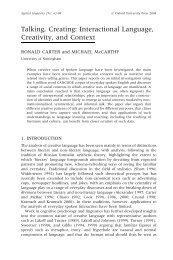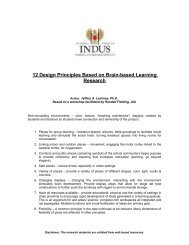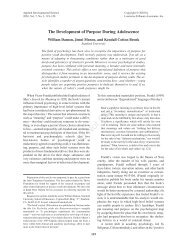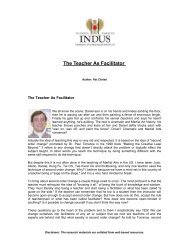Primary Years Programme Making the PYP happen - ITARI
Primary Years Programme Making the PYP happen - ITARI
Primary Years Programme Making the PYP happen - ITARI
- No tags were found...
You also want an ePaper? Increase the reach of your titles
YUMPU automatically turns print PDFs into web optimized ePapers that Google loves.
<strong>Making</strong> <strong>the</strong> <strong>PYP</strong> <strong>happen</strong><br />
What do we want to know about <strong>the</strong> arts<br />
<strong>Programme</strong> of inquiry<br />
Music:<br />
Performing—singing:<br />
Performing—playing<br />
instruments:<br />
Creating/composing:<br />
Listening:<br />
Drama:<br />
Drama for<br />
understanding:<br />
Storytelling and<br />
playmaking:<br />
Performance skills:<br />
Personal and social<br />
development:<br />
Reflection, evaluation<br />
and appreciation:<br />
Drama in society,<br />
cultural perspectives<br />
and world <strong>the</strong>atre:<br />
Visual arts:<br />
The study and exploration of sound and <strong>the</strong> expressive use of musical elements through<br />
<strong>the</strong> singing of songs and <strong>the</strong> playing of instruments. Students develop musical ideas in<br />
composition using musical notation. Students will gain an appreciation and awareness of<br />
music in all its forms from a range of times, places and cultures.<br />
! Students will sing a repertoire of songs on <strong>the</strong>ir own and with o<strong>the</strong>rs displaying<br />
confidence, expression and an awareness of musical elements such as pitch, rhythm etc.<br />
! Students will play increasingly complex musical pieces using a range of instruments<br />
demonstrating style, expression, and an understanding of melodic direction, tempo and<br />
dynamics. Students will have <strong>the</strong> opportunity to perform solo and as part of an ensemble<br />
for an audience, following directions from a conductor.<br />
! Students will use <strong>the</strong>ir imagination and musical experience to organize sounds into<br />
various forms including verse, chorus-binary, etc to create compositions that<br />
communicate specific ideas or moods. Students will use traditional notation to record<br />
<strong>the</strong>ir compositions.<br />
! Students will identify and describe various musical elements such as rhythmic<br />
patterns, melodic patterns and form. Students will distinguish between a range of<br />
instrumental sounds and have <strong>the</strong> opportunity to respond to different styles of music,<br />
and music from different times and cultures.<br />
The study of dramatic performance and production. Students will work independently and<br />
cooperatively in groups drawing stimuli from <strong>the</strong> environment, and using a range of<br />
performance conventions to create effective dramas.<br />
! Students will use drama to examine concepts taken from <strong>the</strong> particular unit of inquiry<br />
being studied. They will use role play to view a situation from <strong>the</strong> perspective of ano<strong>the</strong>r<br />
person and to communicate that perspective using language and gesture.<br />
! Students will explore some of <strong>the</strong> basic elements of drama, such as role, plot,<br />
situation and space, through devising or adapting drama productions.<br />
! Students will develop and portray characters and remain in role in a given situation by<br />
using voice, body and gesture.<br />
! Students will develop negotiation skills and work independently and cooperatively in<br />
small groups.<br />
! Students will reflect on <strong>the</strong>ir own work, and <strong>the</strong> work of o<strong>the</strong>rs in order to enhance<br />
performance.<br />
! Students will discuss experiences of performing arts explaining <strong>the</strong> way a story was<br />
communicated, recognizing <strong>the</strong>atrical conventions from o<strong>the</strong>r cultures and periods while<br />
identifying those elements of <strong>the</strong> production that were effective and those that were not.<br />
The study and appreciation of artworks from a range of cultures and media. Students will<br />
become keen observers of <strong>the</strong>ir environment by identifying principles of art and design in<br />
<strong>the</strong> world around <strong>the</strong>m. They will choose appropriate materials and use previous<br />
experience to communicate <strong>the</strong>ir ideas effectively. Students will provide and accept<br />
constructive criticism of <strong>the</strong>ir own artwork and that of o<strong>the</strong>rs.<br />
Related concepts:<br />
! artifacts<br />
! dramatic tension<br />
! dynamism<br />
! focus<br />
! genres<br />
! improvisation<br />
! information technology<br />
! inspiration<br />
! interpretation<br />
! preparation<br />
! sensitivity<br />
! symbolism<br />
! teacher-in-role<br />
Figure 12 The programme of inquiry: arts<br />
28 © IBO 2000



